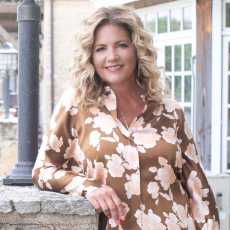Could you share a bit about the history of Edlong, and what it meant for you to inherit a century old, family-run business?
Yes, of course. After the great Chicago fire in 1871, the mayor of the city went to the only bakery that was open in town—the Bremner Biscuit Company—to help feed the victims of the fire. In 1914, the Bremner family and Edward Long went into business together and started Edlong. Our roots started with flavors focused on bakery products, however, when my father, who was a flavorist, joined Edlong in the 1960s, he created the first commercially viable cheese flavors. This was revolutionary for the flavor industry. It led to the innovations that brought consumers the cheese crackers they know today and put Edlong on the road to success. As a result of his innovations that grew the company, my father ultimately became the majority owner.
It is funny, I always knew that I would eventually take over the company, even though I was the youngest of seven kids and my brother was the heir apparent. I studied food science at Purdue and in 1993, after some wider experience in the flavor industry, I joined Edlong. At that time, we had some financial problems - we had been too dependent on one big customer that we had lost. My father let us, being the new generation, take the reins of the company. That is precisely when we decided to narrow down and focus exclusively on what we did best - dairy flavors. That was really hard, because we had to learn to be very disciplined and say no, but we managed it. Today, we are famous for our dairy and non-dairy dairy flavors, it's what we do better than anyone else.
What is the spectrum of application of your products and how big is the dairy-free segment of your product line?
To begin with, it is interesting to note that what counts as a dairy product is not always obvious. There is dairy in a lot of products, beyond milk, ice cream and yogurt. We are in virtually every aisle of the grocery store. It is not just about the taste, but also about the texture, about masking some off-notes, and about the mouth feel - all these functions of flavor - where the essence of dairy is crucial. We even work with the alternative meat industry, because their products often require our inputs to achieve proper texture and familiarity.
Regarding the topic of plant-based versus dairy products, I am convinced that this should be an ‘and’ conversation. We need to figure out how to feed the growing population. I am a supporter of the flexitarian concept, or eating plant-based a couple of times a week, while not giving up dairy entirely. Balance, in other words, is key. In terms of numbers, the dairy-free segment makes up for about 70 to 80% of our product line. It is really interesting that we are at a point where flavoring is so sophisticated, that people cannot tell the difference in taste between classic dairy flavors and dairy-type flavors.
Do you observe a reorientation in the preferences of consumers towards alternative dairy products?
We definitely see this trend and we welcome it. A substantial part of our efforts, probably more than 50% of the projects we are currently working on, are in this category. Interestingly, even the big dairy companies have started making plant-based products now. Dairy and alternative dairy products should complement each other, rather than be in competition. Our collaboration with clients across the food industry is fantastic, and we are always there to support enterprise and innovation. In fact, these trends have incentivized big food companies to become way more entrepreneurial and, as inventors, we welcome these opportunities and love to bring new ideas into reality.
How can the flavor industry improve?
Collaboration with our clients is key, because adding flavors at the end of the development process is not a good idea. Every step of the innovation of food is inter-connected to its final flavor. Our conversations with partners have been essential to optimize formulas and increase the speed at which we get products to market.
All food needs flavor. Nevertheless, most people don’t know very much about the flavor industry. There are less than 600 flavorists in the entire world, which means there are great opportunities for kids in STEM to find a home in our industry. And the beauty of working in this industry is that our work integrates art and science in a way that aligns with how many of our digital-native young people think and want to work.
Starting May, 2023, I will serve as President of the Flavor and Extract Manufacturers Association (FEMA). It will be my honor to lead the biggest industry association of flavor companies in America. One of my key objectives is to educate the wider food industry on the importance of flavors. We certainly need more flavorists in the world. This is one reason why FEMA sponsors scholarships for underrepresented minorities in food science at Tuskegee University. On a personal level, I have been working to amplify the voice of the flavor industry in my podcast, Owning Your Legacy. My guests come to share a lifetime's worth of experience in food, flavor and business, and together we discuss where the industry is headed.
What would you outline as the biggest challenges for the industry and what are your key objectives?
Without question our biggest challenge is nutrition and sustainability to ensure food security.

The real question here is: how can we become the food heroes of our generation? What legacy are we going to leave behind? How will we feed the world and protect the Earth’s resources? The key mindset is to remain open to all kinds of solutions, while being careful not to inflict further damage.
Innovations take place on almost every project we work on, so I am highly optimistic.
Solving this puzzle of nutrition and sustainability, while ensuring good taste, is our mainstay objective. In achieving this, the legacy I would love to leave in this industry is an ethos of transparency, trust, and collaboration. I am looking forward to leading FEMA, and I want to use this platform as best I can. Notably, by increasing the awareness of our industry’s contribution to modern food solutions. The opportunities within the flavor industry are only increasing, and our industry is ready as ever to shape the future of food.





